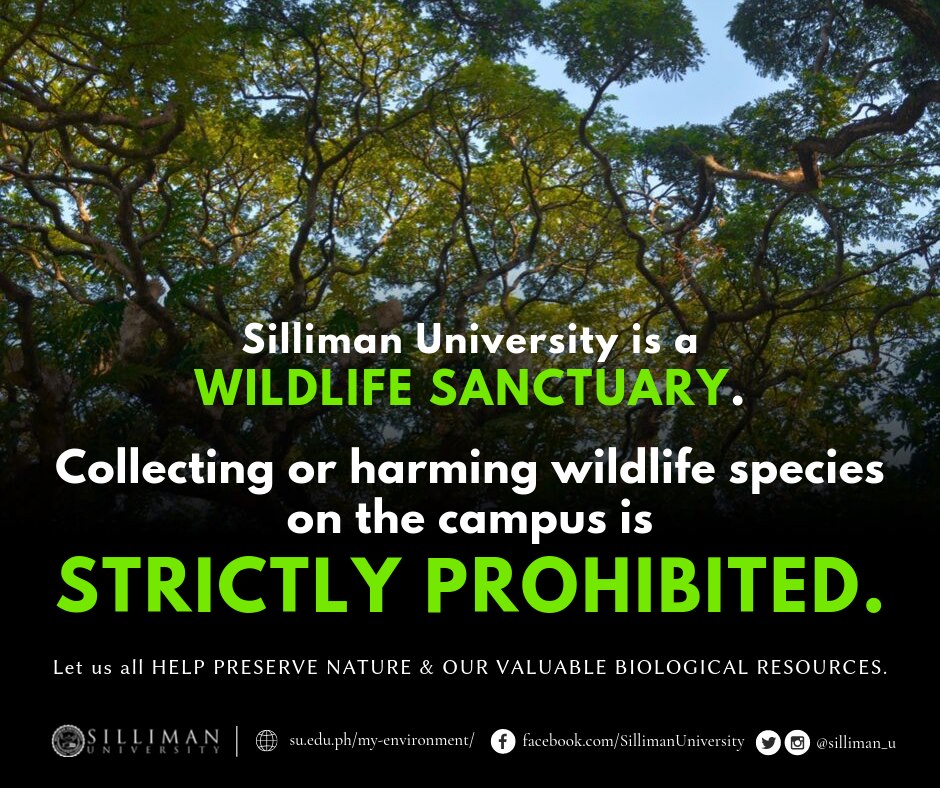Silliman University offers sanctuary for all wildlife
By: Angie Quadra-Balibay
|
Published on: October 14, 2019

Silliman University between the Cuernos de Negros mountains and the Visayan sea is a protected area for wildlife. Credits to Silliman University Facebook.
Silliman University (SU) in Dumaguete, Negros Oriental has declared its campus a sanctuary for all wildlife.
The 62-hectare campus set between the Cuernos de Negros mountains and the Visayan sea will be a protected area where the collecting or harming of wildlife on campus is strictly prohibited.
Silliman University, listed one of 50 Most Beautiful Christian College and University Campuses in the World, posted the declaration on its website and social media on October 3, pledging the “responsibility to protect and conserve wildlife as an institution that has been active in conducting research and advocacy on biodiversity, which includes wildlife species, since 1941.
Silliman’s Board of Trustees (BOT) made the resolution in their meeting last August 27 that the SU campus will add to its 1974 declaration of the campus as a bird sanctuary and become a wildlife sanctuary. The declaration made SU the first institution in the Philippines whose entire campus has been declared a natural bird habitat.

Silliman University takes on the responsibility to protect and conserve wildlife as an institution that has been active in conducting research and advocacy on biodiversity since 1941. Credits to Silliman University Facebook.
Dr. Angel C. Alcala, BOT vice chair and head of Silliman University Angelo King Center for Research and Environmental Management (SUAKCREM), noted the agreement is premised on the need to protect wildlife in the midst of declining tropical rain forests and mangrove forests in the country.
“Studies on Philippine fauna and flora have documented the decline of populations of wildlife in the tropical rain forests and mangrove forests of the country where, as much as 80% of wildlife species are naturally found. These forests have been reduced to fragments and, in general, are not able to support the ecological and biological requirements of wildlife,” said Alcala in the SU report.
The SUAKCREM study of trees and animals indicate that the SU campus hosts the following biodiversity features:
- 69 species of trees
- 44 species of recruited trees and community associates
- 62 species of birds
- 32 species of mammals
- 27 species of reptiles and amphibians
The SU also hosts the A.Y. Reyes Zoological & Botanical Garden and mangrove garden at the Dr. Angel C. Alcala Environment and Marine Science Laboratories.
“Trees have been included (in the study) because they serve as habitats of birds, amphibians, reptiles, and mammals, and they also provide food for the animals,” added Alcala.
The SU wildlife sanctuary areas also include other sites such as:
- SU Farm at the College of Agriculture
- SU Center for Tropical Conservation Studies (Centrop) extension site in Palinpinon, Valencia
Alcala also addressed the following concerns about wildlife on campus:
- No poisonous reptiles, only harmless snakes and monitor lizards are on the Silliman campus
- Frogs on campus are also harmless, said Alcala, except the toad which he said, is not endemic or native in the Philippines and exudes a milky substance which may cause injury to the eyes
- Fruit bats and mammals such as wild cats that come to the campus to feed on fruits from its trees should be allowed
- Pet owners living on campus should feed their pets and get veterinary care to assure they are free of diseases such as rabies
Silliman University has been named one of the top 8 Philippine universities in the QS University Rankings.
SEND congratulations in the comments below to the Silliman University community for declaring itself a sanctuary for wildlife!
Like, Follow, Subscribe to GoodNewsPilipinas.com Facebook, Twitter, Instagram, Good News Pilipinas! TV on YouTube, new story notifications and e-mail newsletters for updates on more Filipino Pride stories.